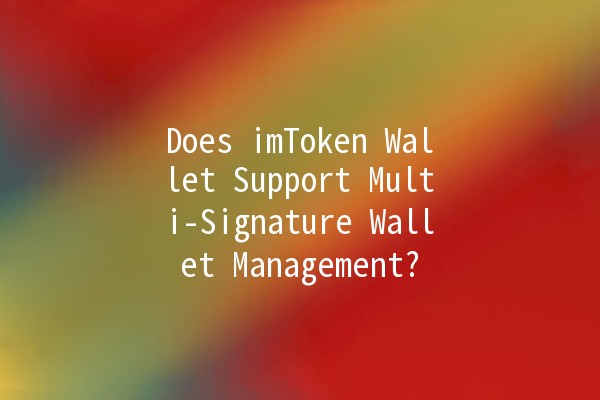In the realm of cryptocurrency, the safety and management of digital assets have become paramount concerns for users. As the market for cryptocurrencies evolves, so too does the need for secure wallets. One such wallet that has gained significant traction among users is imToken. A common question among cryptocurrency holders is whether the imToken wallet supports multisignature wallet management, an essential feature for enhanced security.
This article delves deep into the functionality of imToken concerning multisignature wallets. Ultimately, we aim to provide practical insights and tips for users who wish to enhance their wallet's security through multisignature management.

A multisignature wallet, often abbreviated as multisig, is a type of cryptocurrency wallet that requires multiple signatures (or approvals) to authorize a transaction. This feature adds an extra layer of security by ensuring that no single individual has complete control over the funds. Typically, multisignature wallets are used by organizations or individuals who wish to share control over pooled funds or manage their individual wallets with added security.
In a multisignature wallet, the owner can set up rules regarding transaction approvals. For example, in a 2of3 multisignature wallet, three keys are created, but only two are needed to authorize a transaction. This feature is particularly useful for partnerships, joint ventures, or simply for those who want to enhance their security measures.
imToken is a popular cryptocurrency wallet known for its userfriendly interface and support for multiple cryptocurrencies. Users appreciate imToken for its robust security features and ease of use, making it an attractive option for those new to the cryptocurrency space and experienced traders alike.
To date, imToken does not natively support the management of multisignature wallets. While it provides various security features, such as password protection and private key encryption, the absence of multisignature functionality may be a limiting factor for users who prioritize a multiparty transaction approval process.
Although imToken may not offer multisignature wallet management, there are several ways you can enhance the security of your cryptocurrency assets:
Explanation: A hardware wallet is a physical device that stores your private keys offline. This method significantly enhances security, as it is immune to online threats.
Application Example: Consider using a hardware wallet like Ledger or Trezor alongside your imToken wallet. Transfer larger amounts of cryptocurrency to the hardware wallet for longterm storage, while keeping a smaller amount in the imToken wallet for daytoday transactions.
Explanation: 2FA adds an extra layer of security by requiring two forms of verification before accessing your wallet.
Application Example: If imToken were to integrate 2FA in the future, users should enable it immediately. For now, you can utilize 2FA on any related services you use, such as exchanges or backup systems.
Explanation: Keeping your wallet software updated ensures that you benefit from the latest security features and patches.
Application Example: Check for updates in the imToken app regularly. If a new version is available, install it promptly to mitigate any potential security vulnerabilities.
Explanation: Your private keys are the gateway to your cryptocurrency holdings. Sharing them compromises your wallet's security.
Application Example: Always keep your private keys secure and never share them via email or messaging services. If someone asks for your private keys, it’s likely a phishing attempt.
Explanation: Spreading your cryptocurrency across different wallets reduces the risk of losing everything in case of a security breach.
Application Example: Instead of keeping all your assets in the imToken wallet, consider diversifying by using other wallets. For example, you can use a software wallet for small, daily transactions and a hardware wallet for longterm savings.
Singlesignature wallets, like imToken's current offering, come with certain risks, primarily related to control and security. If someone gains access to your wallet's private key, they can deplete your funds without any further checks or balances.
When choosing a multisignature wallet, consider features such as ease of use, reputation, and compatibility with your existing cryptocurrencies. Look for wallets that have strong encryption and a good track record in the crypto community.
Yes, several platforms support multisignature wallets, such as BitGo, Gnosis Safe, or Coinbase Wallet. Each platform offers different features and charges varying fees, so it's essential to evaluate which suits your needs best.
To protect your private keys, consider generating them offline using a secure computer that is not connected to the internet. Store the keys on unconnected devices or write them down on physical paper and store them in a safe place.
While it may be convenient to use a single wallet, diversifying your assets across multiple wallets can enhance security. This way, even if one wallet is compromised, not all your assets are at risk.
If you're unable to use a multisignature wallet, consider additional authentication methods, such as using timelock contracts or utilizing trusted thirdparty services to oversee transactions.
While the imToken wallet currently does not support multisignature wallet management, users can still implement various strategies to enhance their cryptocurrency security. By utilizing hardware wallets, enabling twofactor authentication, keeping software updated, safeguarding private keys, and diversifying storage solutions, cryptocurrency holders can significantly boost their asset protection. Stay informed, remain cautious, and adapt to the evolving landscape of cryptocurrency management to ensure the longterm security of your digital assets.